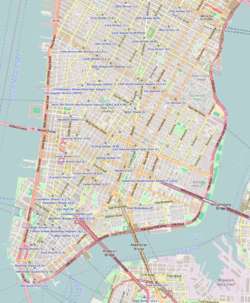Podhajcer Shul
This article relies largely or entirely on a single source. (February 2022) |
| Podhajcer Shul | |
|---|---|
 The former synagogue, now private residence, in 2017 | |
| Religion | |
| Affiliation | Orthodox Judaism (former) |
| Ecclesiastical or organizational status |
|
| Status | Closed; repurposed as a residence |
| Location | |
| Location | 108 East First Street, Lower East Side, Manhattan, New York City, New York |
| Country | United States |
Location of the former synagogue in Lower Manhattan | |
| Geographic coordinates | 40°43′22″N 73°59′12″W / 40.72278°N 73.98667°W |
| Architecture | |
| Date established | 1895 (as a congregation) |
| Completed | 1926 (as a synagogue) |
The Podhajcer Shul is a former Orthodox synagogue, now private residence, located at 108 East First Street, just north of Houston Street, in the Lower East Side neighborhood of Manhattan, in New York City, New York, in the United States.
Although the building has been repurposed to residential use, its façade retains a prominent Star of David, as well as a stone arch inscribed "Beth HaKnesset Ansche Podhajce," which means "Synagogue of the People of Podhajce," and two capitals in the shape of Torah scrolls.
History
[edit]Congregation Masas Benjamin Podhajce was founded in 1895 by Austrian Jews from Podhajce, Galicia. In 1926, they purchased the building on 1st Street and consecrated it as their new synagogue.[1] During the 1920s, another congregation, Rodeph Shalom Independent Pohajce, shared the building with Masas Benjamin Podhajce. Neither of these congregations exist anymore. In the 1980s, a group of Lithuanian Jews named Kochob Jacob Anshe Kamenitz used the synagogue. This congregation was organized in 1892 and had previously met at 248 Division Street, 385 Grand Street and 54–56 Pitt Street. The building was empty from 1985 to 1990, when it was taken over by Congregation Beth Yitzchoch. In 1995, the building was rented as a space for visual and performing arts. The building was later repurposed to residential use.[2]
References
[edit]- ^ Wolfe, Gerard R. (2013). The Synagogues of New York's Lower East Side: A Retrospective and Contemporary View. Empire State Editions. p. 133.
- ^ Lederhendler, E. (2001). "Mingling Past and Present on the Lower East Side: Three Recent Views [Review of Lower East Side Memories. A Jewish Place in America; Remembering the Lower East Side. American Jewish Reflections; Selling the Lower East Side. Culture, Real Estate, and Resistance in New York City, by H. R. Diner, J. Shandler, B. S. Wenger, & C. Mele]". American Jewish History. 89 (2): 231–240. Retrieved December 17, 2023.
External links
[edit]- "History of Congregation Masas Benjamin Anshe Podhajce". Kehila Links. n.d.
- "Synagogue Space". Pan Modern. n.d.
- "Podhajce History and Historical Documents". Kehila Links. n.d.
- Lower East Side
- Former synagogues in New York (state)
- Synagogues in Manhattan
- 1895 establishments in New York City
- Jewish organizations established in 1895
- Synagogues completed in 1926
- 20th-century synagogues in the United States
- 1990 disestablishments in New York (state)
- Houses in New York City
- Manhattan building and structure stubs
- New York City religious building and structure stubs
- United States synagogue stubs

